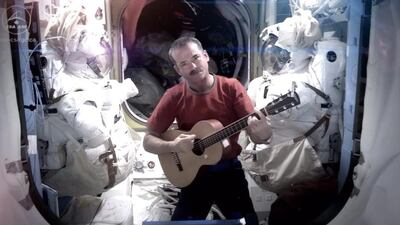DUBAI // A Canadian astronaut, whose social-media postings from the international space station inspired millions, has offered to consult with authorities here about setting up a space agency.
Chris Hadfield, who had an instrumental role in the formation of the Canadian space agency, has spent the past four days visiting Emirati engineers in Dubai and Abu Dhabi.
On Monday he gave a talk at President Sheikh Khalifa’s majlis in the capital.
The UAE last week announced its intention to set up a space agency and launch an orbital probe to Mars by 2021.
“It’s going to take a lot of international cooperation in order to make that work,” said Mr Hadfield. “Hopefully it’s an opportunity for Canada and the UAE to work together.”
Mr Hadfield, who was the commander of the International Space Station for three months last year, was described by Forbes magazine as "perhaps the most social-media savvy astronaut ever to leave Earth".
With the help of his son, Evan, he built a huge online presence and has more than one million followers on Twitter alone. He has had pithy exchanges with William Shatner and other Star Trek actors, and performed a version of David Bowie's Space Oddity with his guitar in the space station.
“It sounds like science fiction, but people have been living in space for 14 years. Until now people hadn’t had any idea of what life was like for those astronauts, and what they were like as people,” said the commander’s son, who is also in the UAE.
The astronaut joined the Canadian Space Agency in 1992, three years after it was formed. He has identified similarities between the Canadian agency’s early experience and the UAE’s aspirations.
He praised the nascent UAE agency as “bold” in setting a goal to have a Mars orbiter, but stressed it was important for the success of the mission to have sufficient international support.
“They’ve set themselves a six or seven-year timeline, which is very ambitious,” he said.
“It’s certainly doable, but it’s not doable alone, because they don’t have time to make mistakes. They need to learn from other people’s mistakes, so they’re going to need a lot of international cooperation.”
However, he highlighted how the satellite programmes run by YahSat in Abu Dhabi and the Emirates Institute for Advanced Science and Technology in Dubai, had, through skills transfer with international partners, fostered an already considerable pool of national talent.
“The people putting the agency together are smart and forward thinking,” he said. “Every single thing we do cooperatively, they will learn nationally. It becomes a catalyst to learn new expertise, so that five years from now, when this probe is finished, they can put a UAE rover on the moon and do it nationally.”
He added that by setting a target that was only just within reach, the agency would push itself, and thus develop talent for later projects.
“It’s not like the sole purpose of the UAE space agency is going to be to send one probe to Mars,” said Mr Hadfield. “That’s just the initial step, that’s going to help unify everything and create the structure, build allegiances and start building the national capability, so that later you can accomplish more, and more at a national level.”
The space agency would likely foster development into new patentable technology, he said, which would help develop a healthy mixed economy.
It would also inspire a new generation of scientists and engineers, he said.
“If you’re a kid growing up in the Emirates and you dream about being an astronaut, the opportunity will probably soon exist, nationally,” he said.
“If you’re in any of the surrounding states, you say ‘I love being Omani, or Saudi, but I’d really like to design rocket ships’. Well, where are they going to go? A programme here will bring people in and inspire people.
“It’s ambitious. It’s going to take a lot of work, but I think it will really pay off.”
mcroucher@thenational.ae

